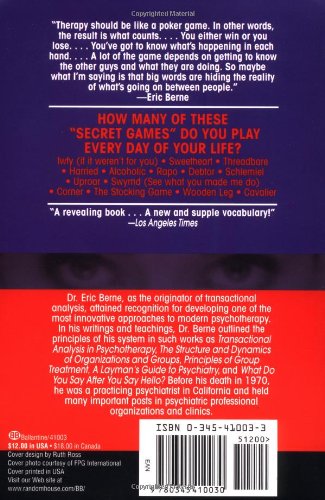I was introduced to Transactional Analysis by the book - "I'm OK. You're OK." - and after reading the book I was hooked and hungry for more information on the topic. Which nerd would not be interested in a branch of science that refers to verbal and non-verbal communication between people as transactions and then uses objective ways of analyzing these communications?
Games People Play: The Basic Handbook of Transactional Analysis.">Games People Play takes off from where "I'm OK. You're OK." left off and is the natural "next read" of I'm-OK-You're-OK, specially if you're interested in Transactional Analysis as a topic.

Given the fact that Eric Berne happens to be the father of Transactional Analysis, I had a lot of expectations from this book and this booked lived up to every single one of those expectations.
Apart from the concepts of the Parent Adult and Child (which I talked about in my previous post when talking about I-am-ok-you-are-ok) Eric covers the concept of pass-times that people indulge in and, as the title suggests, the games people play.
Games in TA are certain patterns of transactions (TA refers to both verbal and non-verbal communication between people as transactions) which recur repeatedly in every day life where the intentions of the transactions aren't very obvious.
Eric starts the book with an example of a game call NIGYSOB (Now I’ve Got You, You Son of a Bitch):
While his parents and their friends were drinking coffee at the kitchen table, Jonny, age five, ran in and out of the room, happily pulling his favorite truck behind. Suddenly, there was a crash in the living room, his mother found a glass vase knocked off the coffee table and shattered.
"Who did that?" she asked.
"Doggie," he replied.
Mother's neck reddened. She knew she had let the dog out five minutes before. Stepping forward she hit him saying, "I will not have a child who lies!"
It was obvious who broke the case. Consequently, Jonny's mother's question as to who broke the vase, while superficially an Adult request for information, was, at the psychological level, really an invitation for Jonny to lie - and he did.
As mother's neck reddened, she was switching ego states from Adult to Parent. Her payoff was a sudden surprise feeling of righteous wrath.
We would say that mother played the game of "Now I've Got You, You Son of a Bitch" (NIGYSOB). It should be noted, however, that she had not deliberately and consciously set out to "get" her son and to hit him.
On the contrary, she was quite distraught by the outcome. Jonny for his part, played "Kick Me". If he had said, "I did it", there would have been no game.
The book goes on to describe not just dozens of games people play in every day life, but it gives each game an equally interesting name. The book makes you laugh, it makes you think and it makes you wonder about how predictable and similar we are as human beings. With every game Eric also talks about how you can choose not to play games and gives solid practical advice on building game-free relationships and eventually a game-free life.
While the book provides an entertaining insight into the games we play and even deeper insights into why we play them, it also nudges us to push the adult part of our brain to take control so that we can have a game-free mature existence.
All in all, a must read for anyone who is interested in becoming a better individual. A book that's much better than peppy self help books because it uses real life case-studies of people who have been given TA treatments to heal them and improve their relationships, personalities and life. If this was an Amazon Rating, I'd give this book a solid 4 out of 5.
Comments are closed.